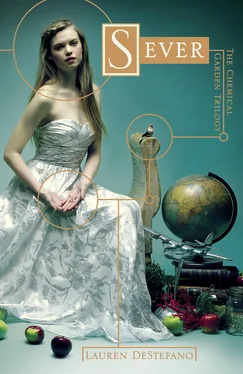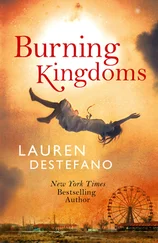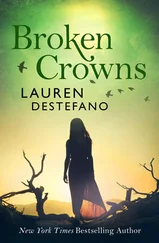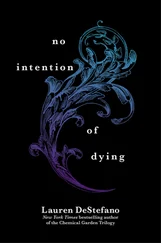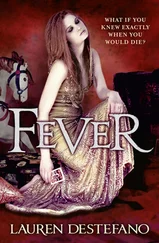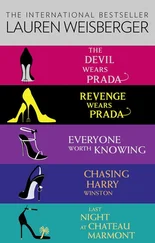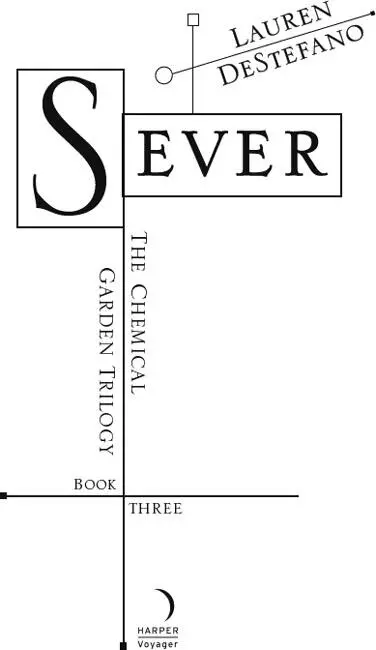
For
Riley,
Isaiah,
Isabella,
Hailey,
Cameron,
Mary,
Cooper,
Eliot,
and
Raina,
Who have a lifetime
Of roads before them
I must lose myself in action,
lest I wither in despair.
—Alfred, Lord Tennyson
Table of Contents
Title Page
Dedication For Riley, Isaiah, Isabella, Hailey, Cameron, Mary, Cooper, Eliot, and Raina,
Epigraph I must lose myself in action, lest I wither in despair. —Alfred, Lord Tennyson
Chapter 1
Chapter 2
Chapter 3
Chapter 4
Chapter 5
Chapter 6
Chapter 7
Chapter 8
Chapter 9
Chapter 10
Chapter 11
Chapter 12
Chapter 13
Chapter 14
Chapter 15
Chapter 16
Chapter 17
Chapter 18
Chapter 19
Chapter 20
Chapter 21
Chapter 22
Chapter 23
Chapter 24
Chapter 25
Chapter 26
Chapter 27
Chapter 28
Chapter 29
Chapter 30
Chapter 31
Acknowledgments
About the Author
Praise for the Chemical Garden Trilogy
By Lauren DeStefano
Copyright
About the Publisher
IN THE ATLAS the river still flows. The thin line of it carries cargo to a destination that no longer exists. We share a name, the river and I; if there’s a reason for this, it died with my parents. The river lingers in my daydreams, though. I imagine it spreading out into the greatness of the ocean, melting into sunken cities, carrying old messages in bottles.
I have wasted too much time on this page. Really I should be in North America, charting my way from the Florida coastline to Providence, Rhode Island, where my twin brother has just bombed a hospital for its pro-science research on embryos.
I don’t know how many are dead because of him.
Linden shifts his weight restlessly. “I didn’t even know you had a brother,” he’d said when I told him where I was going. “But the list of things I don’t know about you is growing longer every day, isn’t it?”
He’s bitter. About our marriage and the way it ended. About the way it’s not really over.
My sister wife looks out the window, her hair like light through autumn leaves. “It’s going to rain,” she says quietly. She’s here only at my insistence. My once-husband still doesn’t quite believe she was in danger in his father’s, Vaughn’s, home. Or maybe he does believe it; I’m not sure, because he’s barely speaking to me these days, except to ask how I’m feeling and to tell me I’ll be discharged from the hospital soon. I should consider myself lucky; most of the patients here are crammed into the lobbies or a dozen to a room, and that’s if they’re not turned away. I have comfort and privacy. Hospitalization of this class is reserved for the wealthy, and it just so happens that my father-in-law owns nearly every medical facility in the state of Florida.
Because there is never enough blood for transfusions, and because I lost so much of it when I sawed into my leg in a maddened delirium, it took me a long time to recover. And now that my blood has regenerated, they want to take it a bit at a time and analyze it to be sure I’m recovering. They’re under the assumption that my body didn’t respond to Vaughn’s attempts to treat the virus; I’m not sure what exactly he told them, but he has a way of being everywhere without being present.
I have an interesting blood type, they say. They wouldn’t have been able to find a match even if more people donated their blood for the meager pay the hospital gives.
Cecily mentioned the rain to distract Linden from the nurse who has just sterilized my arm. But it doesn’t work. Linden’s green eyes are trained on my blood as it fills up the syringe. I hold the atlas in my blanketed lap, turn the page.
I find my way back to North America—the only continent that’s left, and even it isn’t whole; there are uninhabitable pieces of what used to be known as Canada and Mexico. There used to be an entire world of people and countries out there, but they’ve all since been destroyed by wars so distant they’re hardly spoken about.
“Linden?” Cecily says, touching his arm.
He turns his head to her, but doesn’t look.
“Linden,” she tries again. “I need to eat something. I’m getting a headache.”
This gets his attention because she is four months pregnant and prone to anemia. “What would you like, love?” he says.
“I saw brownies in the cafeteria earlier.”
He frowns, tells her she should be eating things with more sustenance, but ultimately succumbs to her pouting.
Once he has left my hospital room, Cecily sits on the edge of my bed, rests her chin on my shoulder, and looks at the page. The nurse leaves us, my blood on his cart of surgical utensils.
This is the first time I’ve been alone with my sister wife since arriving at the hospital. She traces the outline of the country, swirls her finger around the Atlantic in tandem with her sigh.
“Linden is furious with me,” she says, not without remorse, but also not in her usual weepy way. “He says you could have been killed.”
I spent months in Vaughn’s basement laboratory, the subject of countless experiments, while Linden obliviously milled about upstairs. Cecily, who visited me and talked of helping me escape, never told him about any of it.
It isn’t the first time she betrayed me; though, as with the last time, I believe that she was trying to help. She would botch Vaughn’s experiments by removing IVs and tampering with the equipment. I think her goal was to get me lucid enough to walk out the back door. But Cecily is young at fourteen years old, and doesn’t understand that our father-in-law has plans much bigger than her best efforts. Neither of us stands a chance against him. He’s even had Linden believing him for all these years.
Still, I ask, “Why didn’t you tell Linden?”
She draws a shaky breath and sits more upright. I look at her, but she won’t meet my eyes. Not wanting to intimidate her with guilt, I look at the open atlas.
“Linden was so heartbroken when you left,” she says. “Angry, but sad, too. He wouldn’t talk about it. He closed your door and forbade me from opening it. He stopped drawing. He spent so much time with me and with Bowen, and I loved that, but I could tell it was because he wanted to forget you.” She takes a deep breath, turns the page.
We stare at South America for a few seconds. Then she says, “And, eventually, he started to get better. He was talking about taking me to the spring expo that’s coming up. Then you came back, and I thought, if he saw you, it would undo all the progress he’d made.” Now she looks at me, her brown eyes sharp. “And you didn’t want to be back, anyway. So I thought I could get you to escape again, and he would never have to know, and we could all just be happy.”
She says that last word, “happy,” like it’s the direst thing in the world. Her voice cracks with it. A year ago, here is where she’d have started to cry. I remember that on my last day before I ran away, I left her screaming and weeping in a snowbank when she realized how she’d betrayed our older sister wife, Jenna, by telling our father-in-law of Jenna’s efforts to help me escape, which only aided his decision to dispose of her.
But Cecily has grown since then. Having a child and enduring the loss of not one but two members of her marriage have aged her.
“Linden was right,” she says. “You could have been killed, and I—” She swallows hard, but doesn’t take her eyes from mine. “I wouldn’t have been able to forgive myself. I’m sorry, Rhine.”
Читать дальше
